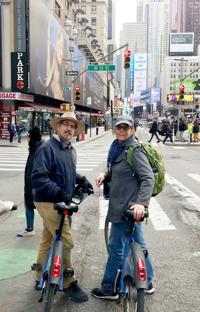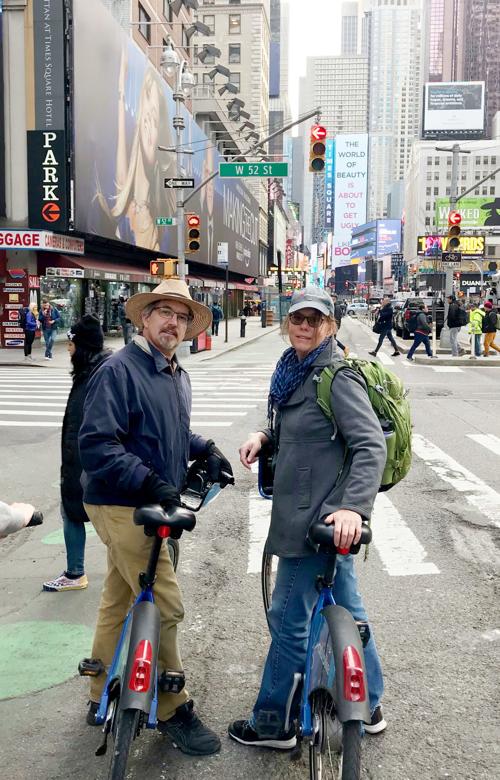Out shopping in Tucson last weekend, as the shadow of coronavirus began to fall over Arizona, it was easy to decide whether to buy 120 rolls of toilet paper.
No way.
It was a lot harder, though, to decide whether to take or postpone a long-planned trip to New York City.
I had planned to be in New York last week, first alone for a couple of days of work, then for a family trip starting Tuesday night when my wife and kids were to arrive. But it became clear last weekend the outbreak might interfere with our plans as the virus popped up in New York.
I canceled the first couple of days of work-related interviews when key ones didn’t pan out, and planned to go with the rest of the family Tuesday. But last weekend, I agonized over the family trip. It was to take place over my daughter’s birthday, and my son was to join a group of schoolmates arriving on Friday.
I knew things could go badly, but it took me a while to wrap my mind around all the different ways.
Traveling by airplane during an outbreak is risky, obviously. These flying germ tubes are notorious for spreading sickness among passengers.
Then there was the risk of catching the coronavirus in New York. The city had relatively few known cases — a minuscule proportion of the population. But it was clear that since so few people were being tested, the number of carriers was probably much higher. I multiplied by 100 and decided the number was still small.
New York itself is a tough place to avoid being near other people, some of whom will inevitably end up catching the virus. In fact, the crowds are part of the fun, if you like that sort of thing.
As far as the danger of any of us getting sick, the probabilities suggested it would be at worst a flu-like sickness. But if any of us got it, that would mean a two-week quarantine in New York — expensive and uncertain. And if things got bad in New York, imagine being in an overcrowded hospital with doctors and nurses falling ill as in Italy. Scary.
Then, of course, there was the tough issue not of being a victim, but a vector. The coronavirus can have such mild symptoms you don’t know that you’re carrying it. But it has been extraordinarily deadly to older people.
And we have older people in our lives. My mother-in-law lives adjacent to us. My parents are snowbirds who we see frequently. They are all in their 80s — prime vulnerable ages.
On the other hand, though, things were unlikely to be disastrous. My daughter even put together a PowerPoint presentation showing how small the numbers of affected New Yorkers were and why we should go anyway.
On Monday morning, we weighed the risks and options, and we decided to go. It was a great weight off my back, and I felt optimistic.
But Monday night, the night before our flight, I got worried again. I texted a friend of mine who is an expert in epidemics. He said the same practices would offer protection in Arizona or New York: hand-washing, not touching our faces, and staying away from sick people. He said he’d be comfortable going.
So we went.
We took a flight from Phoenix, for reasons related to my son’s school trip, and it was packed.
Riding into Manhattan for the first time, my daughter was awed, even a little scared. We went to bed in our hotel.
And I could not sleep. I felt a pain in my mid-back — could it be pneumonia? My son next to me in the bed — his breathing didn’t sound so good as he snoozed. It took half a night of anxiety before I finally fell asleep.
Wednesday was a wonderful day — biking in Central Park, tooling around the city, seeing a Broadway show. Of course, we cleaned the seats with antibacterial wipes and wondered who in the crowd likely had the virus.
Then we arrived back to the hotel to a cascade of disastrous news. All the sports leagues canceling their games, schools closing, travel from Europe suspended. It felt like standing on the edge of a precipice as events spiraled.
And we were nowhere near home.
Thursday arrived and bad news continued. Broadway announced it was closing all its performances, the museums closed, a store my daughter had planned to visit closed all its locations. The subway was open but we didn’t dare go in it. My son’s tour group canceled. The PowerPoint had not accounted for cascading effects of trying to contain the virus.
I booked tickets home for all of us on Saturday, a day early.
Then we got out, walked around, and found a city seeming to go about its life. We went to the top of Rockefeller Center and caught the view, quickly passed through big crowds in Times Square and headed out to dinner. Optimism reigned again.
But I couldn’t help but wonder if this normalcy would cause problems soon. People in Milan and northern Italy had gone about their normal lives when the virus arrived, but within a couple of weeks their health-care system was overwhelmed. They were too casual.
Even as we went about the apparently normal city, I wondered, what if one of us gets sick? And what if the hospitals become overwhelmed when one of us needs them? It was easy to catastrophize.
But it was also easy to look around and be optimistic and happy.
As we boarded the flights Saturday, I couldn’t help but feel relief. If trouble hit us, at least we would be home.
Once home in Tucson, I can head back to the store and pick up all the toilet paper and necessities I need. Right?





